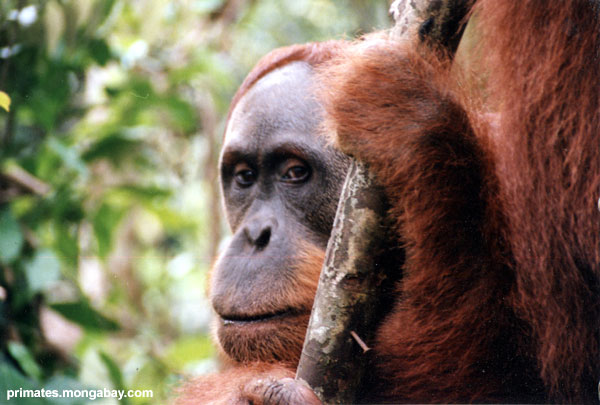|
|
|
|
 Orangutans are threatened by illegal rainforest logging in Indonesia
Orangutans are threatened by illegal rainforest logging in Indonesia
|
Taiwan urged to stop imports of illegally logged ramin wood from Indonesia
Ban sale of ramin: lobby group
By Evelyn Shih
CONTRIBUTING REPORTER
Thursday, Jul 15, 2004,Page 2
Original Article
Taiwan should act as a model for Southeast Asia by banning the use of endangered ramin wood, said representatives from the Environmental Investigation Agency (EIA), an international non-governmental organization.
"Illegal logging is a severe regional problem, one in which Taiwan plays a key role," EIA campaign coordinator Sascha von Bismarck said yesterday at a press conference.
A coalition of environmental organizations, including Greenpeace and the Sierra Club, sent a letter to President Chen Shui-bian,asking him to forbid the use of ramin altogether until illegal logging can be stopped at its source in Malaysia and Indonesia.
Shrinking Indonesian rainforests, home to highly endangered orangutans, are the most common sources of ramin in the region, von Bismarck said, adding that national wildlife reserves are also often plundered.
The wood is heavily favored by local manufacturers for making pool cues, picture frames and baby cribs, among other products, because of its long grain and pleasant color. Ramin is smuggled from Indonesia to Malaysia and then to manufacturers in Taiwan, China and Europe by organized criminal groups, von Bismarck said. Finished products are then sold worldwide.
Von Bismarck encouraged Tai-wan to "step out of the chain" and take the initiative to help save Indonesian forests, which make up 10 percent of surviving rainforests around the world.
The Convention on International Trade in Endangered Species (CITES), an international agreement from August 2001, forbids the sale of ramin wood from Indonesia except through select government-approved companies.
However, according to EIA research, illegal loggers in Indonesia have continued to find buyers in Malaysia, where corrupt government officials certify the wood as a legal Malaysian export.
An undercover investigation by EIA of Kaohsiung furniture company Nan Far led the organization to suspect that there was a heavy local reliance on illegal wood, von Bismarck said.
"Factory owners admitted to taking advantage of loose regulations in southeast Asia," he added. "There must be an intense investigation, backed by a strong political will, in order to get to the bottom of these criminal actions."
Jwo Jong-jeng, a senior official at the Bureau of Foreign Trade, thanked the group for its information, but stressed that investigations had to follow guidelines.
"We are a nation that follows the rule of law," Jwo said, "and must complete comprehensive investigations before we begin arresting anyone."
Jwo added that there were more than 10 Taiwanese manufacturing companies currently under investigation for using smuggled ramin wood, but that the bureau would consider all suspects innocent until proven guilty.
"It is not a small matter for us to charge that official Malaysian documents are illegitimate," Jwo added.
"Taiwan is not a CITES nation because of our marginal status," said Peter Ho (��"�}), director of Import and Export Licensing at the bureau. "Nevertheless, we have strived to maintain CITES standards with regard to ramin exports since 2001."
Since May 26, Taiwan has strongly enforced both import and export controls on ramin shipments, Ho said. He questioned the rationale behind demanding a complete ramin ban in Taiwan, when CITES nations such as the US, Australia and Japan have not taken similar action.
Von Bismarck said that the US government was considering sanctions against Malaysia because of CITES violations uncovered in EIA investigations.
"Companies like Wal-Mart are also beginning to remove ramin products from their stores due to EIA efforts," he added.
Jwo and Ho said they hoped to build better relations with the EIA.
Copyright 2004, The Taipei Times
CONTENT COPYRIGHT The Taipei Times. THIS CONTENT IS INTENDED SOLELY FOR EDUCATIONAL PURPOSES.
mongabay.com users agree to the following as a condition for use of this material:
This site contains copyrighted material the use of which has not always been authorized by the copyright owner. Such material is made available in an effort to advance understanding of environmental issues. This constitutes 'fair use' of any such copyrighted material as provided for in section 107 of the US Copyright Law. In accordance with Title 17 U.S.C. Section 107, the material on this site is distributed without profit. If you wish to use copyrighted material from this site for purposes of your own that go beyond 'fair use', you must obtain permission from the copyright owner.
If you are the copyright owner and would like this content removed from mongabay.com, please contact me.
|